Five Things We Learned from a Weekend at Foundry in Toronto
All month long, Toronto has been playing host to the inaugural edition of Foundry, an […]
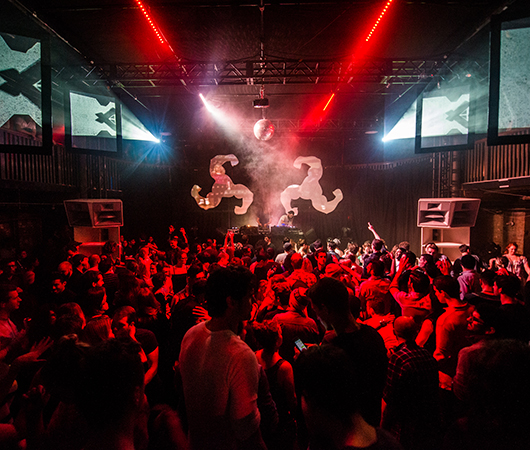
Five Things We Learned from a Weekend at Foundry in Toronto
All month long, Toronto has been playing host to the inaugural edition of Foundry, an […]

All month long, Toronto has been playing host to the inaugural edition of Foundry, an ambitious new event series held over five separate weekends and incorporating a wide array of forward-thinking electronic talent. Seeing as how the bulk of the artists performing have received their fair share of attention here on XLR8R over the years—prior weekend headliners included Shlohmo, Omar S, Andy Stott, and Juan Atkins—when the Foundry organizers extended an invitation for us to attend a couple of shows, we were more than happy to accept. After all the trip not only afforded an opportunity to check out DJ sets from the likes of Martyn, Bicep, Nautiluss, Kevin McPhee, and others, but it also offered the chance to explore Toronto’s club scene, something which largely remains a question mark for most people outside of the city. After two long nights of partying, we definitely learned a few lessons, and have elected to share our findings here.
BLK BOX, Friday Night
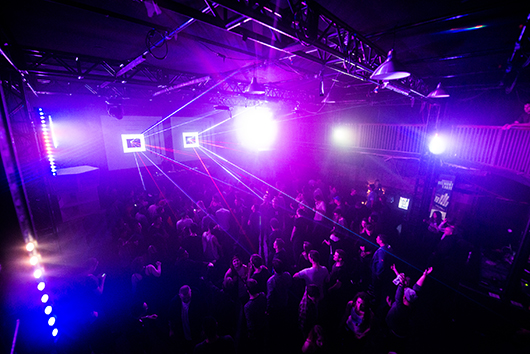
The BLK BOX Theatre is a quality venue.
Situated in the city’s increasingly trendy West Queen West neighborhood, the BLK BOX Theatre has served as Foundry headquarters. Situated in a basement, the space was formerly an old theater, but has recently been refashioned into a fairly raw locale that—true to its name—is essentially a big, black box. This is not a bad thing, as it’s also been outfitted with an impressively booming Funktion-One rig. Between the gut-rattling soundsystem and unpolished aesthetic, it’s not a stretch to say that being at BLK BOX harkened back to a bygone era of raving that has all but disappeared in 2013. At the same time, Foundry didn’t have a particularly illicit or “underground” feel—the production was far too professional for that—even if the experience of being at the parties was also a far cry from being at a proper “club.” The music was loud, the venue was a little grimy, there was nowhere to sit, people were dancing, and the vibes were positive.
BLK BOX, Saturday Night
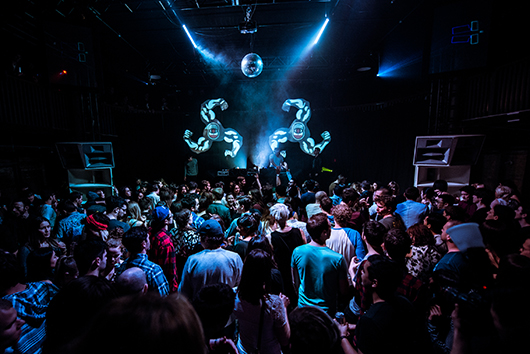
Still, one shouldn’t get the impression that the event organizers simply booked the talent and showed up to turn on the soundsystem. Each night featured custom visuals, which unquestionably enlivened the space and managed to do so with becoming overbearing. Rather than assaulting the senses, the array of lights, lazers, and cut-out installations (the giant renderings of the Bicep logo on Saturday night were a particularly inspired choice) subtly enhanced the overall experience.
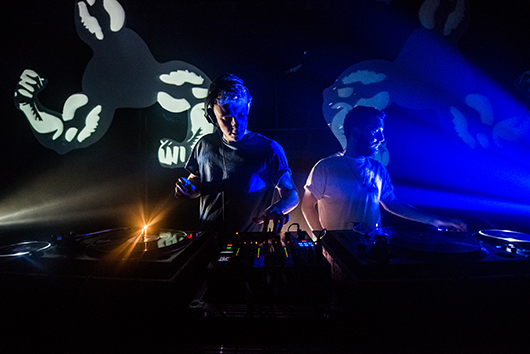
Bicep is at the top of its game—and really likes techno.
Bicep headlined Saturday night’s proceedings at Foundry, and the duo’s nearly three-hour set—its last of a three-week North American tour—demonstrated why the pair has seen such a rapid ascent during the past year. Although the Belfast-reared, London-based outfit is often tied to the current wave of ’80s and ’90s house nostalgia, Bicep’s range extends well beyond retro-flavored enthusiasm. This isn’t news for those who have been following the pair’s blogging or DJ exploits over the past few years, but for those who only began paying attention once “$tripper” and “Vision of Love” surfaced, it may come as a bit of a surprise. In fairness, Bicep’s selections at Foundry did include some of the uplfiting piano melodies, bouncy basslines, and skittering hi-hats one might have expected, but the set was largely focused on techno, much of it with some serious low-end heft. Granted, the duo’s inherently playful spirit continued to shine through, but it was encouraging to see that the group has elected to continue evolving and expanding its musical reach instead of merely resting on its laurels.
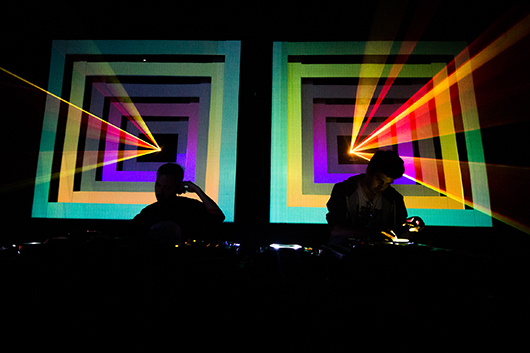
Nautiluss and Kevin McPhee lead Toronto’s impressive crop of local talent.
Looking over the entire Foundry schedule, it’s clear that organizers sought to do more than simply stage a bunch of shows with tastemaker-friendly talent. Celebrating Toronto was undeniably part of the agenda, and Foundry did a nice job of weaving local acts into the mix; for instance, the opening weekend saw Deebs supporting Shlohmo while Gingy and Alixander III opened up for Juan Atkins. Friday and Saturday’s show were no different. Before Bicep stepped behind the decks, the dancefloor was warmed up nicely by Toronto’s own Lapelle and Members Only. The former got things started with a well-mixed selection of vintage (and vintage-inspired) house cuts, smartly building a vibe without taking things over the top. Members Only jumped on around 11:45 p.m. and took things in a decidedly groovier direction, dabbling in disco and classic house before upping the energy and banging things out a bit as the floor swelled toward capacity.
Members Only
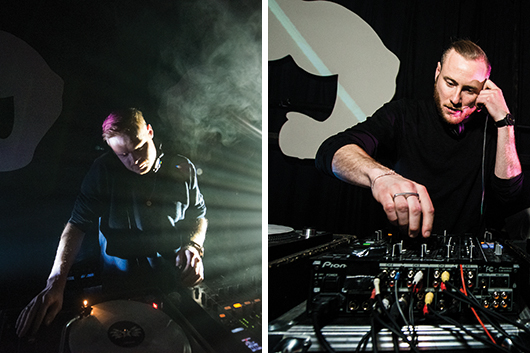
Friday’s party—which was billed as a 3024 label night—opened in a slightly more abstract direction, as local staple Mymanhenri delved into various strains of beats and bass while partygoers took their time arriving. He did an adequate job, but the evening’s top honors undoubtedly went to Nautiluss and Kevin McPhee; in the wake of both producers appearing on the recently issued Dovercourt EP, the two teamed up at Foundry for a rare back-to-back set. Although Nautiluss and McPhee are accustomed to playing individually, they proved to be quite the tandem behind the decks. Beginning with some classic house sounds, the pair gradually turned down the polish and turned up the low-end rumbles, moving slowly toward a raw brand of warehouse-ready techno. Leaning heavily on new cuts, the duo demonstrated that the nebulous zone where house, techno, and bass music come together continues to yield some incredibly compelling results. Both artists have multiple releases slated for the months ahead, and it will be exciting to see where they take things in 2013.
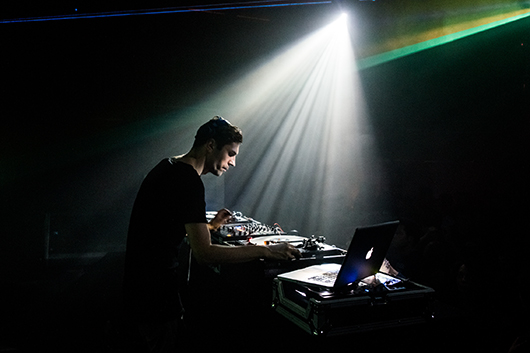
Martyn is a badman DJ.
This won’t be shocking for anyone who’s previously seen the 3024 boss in action, but Martyn was excellent during his headlining set on Friday night. From a purely technical standpoint, he’s an impeccable DJ, but his brilliance goes beyond mere execution. Simply put, Martyn is an artist who insists on evolving; after more than a decade in music, he’s already left his mark on drum & bass and dubstep, and now finds himself ostensibly operating in the techno sphere. That said, he never comes across as a trend hopper—his changes have always felt natural and organic, and though his musical history may be varied, he hasn’t filed away his past ventures into a drawer to be forgotten. On the contrary, Martyn utilizes them as a sort of creative reserve, fleshing out his current endeavors with choice tidbits he’s picked up along the way. This was certainly the case during his set at Foundry; there aren’t many DJs who can drop in a seminal cut like “I Feel Love” without it coming across like a gimmick, but Martyn slipped it into the maelstrom of his usual dark and pulsing rhythms as though the combination was the most natural thing in the world. Of course, the set also featured a few of Martyn’s own cuts, along with a number of enticingly unknown and sonically hard-to-pin-down selections.
Lapelle
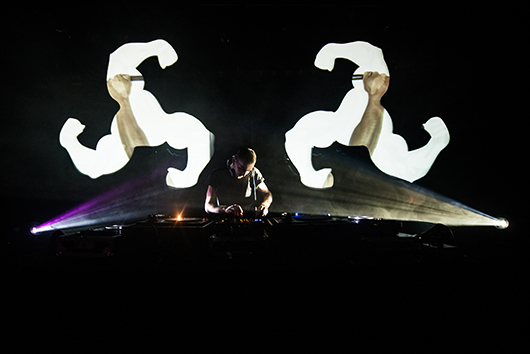
Now is the right time for Foundry in Toronto.
Toronto is the biggest city in Canada. Without question, it’s a major artistic, cultural, and musical hub, and a place that’s home to throngs of forward-thinking, open-minded people. Yet when it comes to electronic music, the city is rarely named as an important locale or seen a hotbed for new talent. Although it’s hard to pin down exactly why this is happening, many local artists we spoke with over the course of the weekend cited a severe lack of venues, particularly small- and medium-sized ones. The city’s current development and condo boom isn’t helping matters, and neither is the fact that most places have to turn off the alcohol and wrap up the party at 2 a.m.
Nautiluss
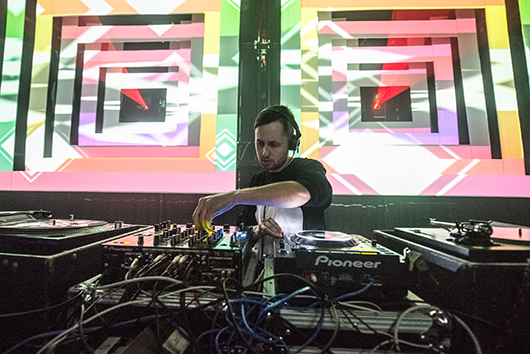
That said, these issues aren’t unique to Toronto—much of North America suffers from similarly trying circumstances. At the same time, Toronto does stand out in one very real way—few cities with these problems can claim to have a comparable wealth of talent. In just two nights at Foundry, it was truly impossible not to notice just how many quality DJs, producers, and promoters populate the city. More importantly, they all seemed to know and support one another. Moving through the Foundry audience, it often seemed like there were just as many quality artists in the crowd as there were on stage. Of course, it’s quite possible that many of them will eventually be tempted to follow the long-standing tradition of Canadian electronic artists pulling up stakes and relocating to Berlin, but right now, there’s unquestionably a foundation in place for the Toronto scene to make the proverbial leap onto a larger stage. It’s simply a matter of someone putting the pieces together and calling attention to what’s going on.
That’s why an event series like Foundry has the potential to be a real milestone for the city. Even with its relatively forward bookings, the events we attended were packed, and not just with tastemaker types. Granted, the crowds of 500-600 people weren’t exactly massive, but they more than filled the space and certainly outstripped the size of the average “cool” electronic event one would come across in most North American locales. More importantly though, a night at Foundry simply felt like a party filled with a variety of adults who just happened to like credible electronic music. As such, the dancefloor was refreshingly free of candy ravers, confused EDM enthusiasts, and douchey club refugees, making for an undeniably fun night out. Foundry was focused on music, not spectacle, and for that, its organizers are to be commended.
Kevin McPhee
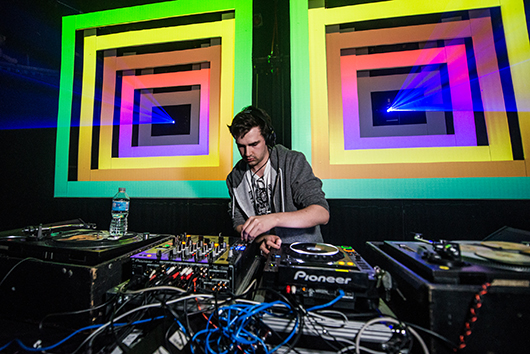
Perhaps the most telling quote of the weekend came from XI (a.k.a. Christian Andersen), a Toronto-based producer who recently returned to the city after a stint in Berlin. Like many artists we encountered, he was not performing at Foundry, but was nonetheless in attendance at Friday’s 3024 showcase. Talking about the event, he said, “Lots of people here are wondering why they haven’t been going to parties like this for years.” It was a simple observation, but one that spoke volumes about where Toronto is at in terms of electronic music. Although Foundry is an event series without many real parallels in the city, being at the party felt remarkably normal, which is certainly a very good sign. Sometimes, being ready to take a step forward is just as important as the actual act of taking the step, and if this weekend’s Foundry parties were an accurate indication, Toronto is prepared to move.

